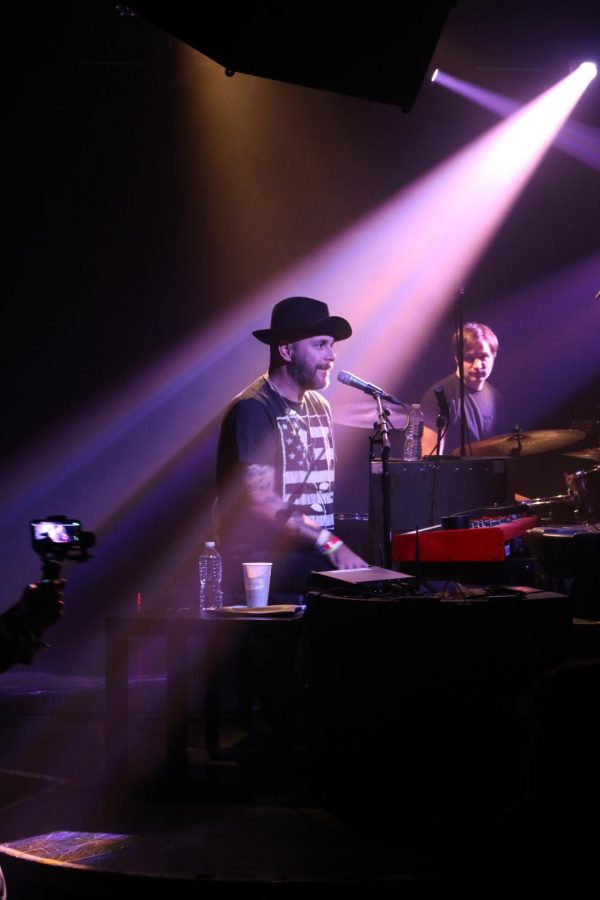Greg Laswell Finds Meaning in Melancholy in ‘Covers’
KENDALL BOTTJER/THE OBSERVER
Laswell puts his own moody, melancholy spin on the songs he covers, many of which he performed at his recent concert. Afterwards, he interacted with the audience to connect with them face-to-face as well as through his music.
October 21, 2019
I first listened to Greg Laswell in his album “Three Flights from Alto Nido” in the sixth grade; his melodies were moody and with a keen emphasis on powerful lyrics, just what an 11-year-old girl who’d never felt pain can appreciate. What I didn’t know at that age was Laswell’s unique ability to cover songs. He had released “Covers” — where he reinterpreted songs from the likes of Kate Bush, Echo & The Bunnymen, Mazzy Star and others — just three years prior in 2008. Now, 11 years later, the LA-based singer-songwriter is now revisiting that undertaking with “Covers II,” featuring the reinterpreted alternative rock works of a whole new set of artists including Depeche Mode, Peter Gabriel and The Verve among others. At his recent concert at (Le) Poisson Rouge, I saw this skill in action.
Many artists attempting to cover a set of songs often go unnoticed, their work seeming little more than pointless exercises in mimicry. But Laswell approaches each of these songs with appropriate reverence, adding his self-described style of “melancholy, slow alternative pop music.”
On the night of the concert, that melancholy style was clear. He was often lit by a single stream of light. The silhouette of a man curled over his keyboard, choosing to do a few songs either a cappella or leaving out the full band, created this heavy environment. Pausing to hold back tears before he performed his song “Supermoon,” he made sure to tell the audience, “I don’t like to talk about the meaning of my songs because you make it your own — I’m reluctant to take that experience away from you.” Yet he continued to explain the meaning of the song as a reflection on his father’s passing from Alzheimer’s last year.
As the room grew quiet and he collected himself, Laswell shared the importance of pain: He argued that his songs — while written about one source of his own pain — could be relatable to those going through their own relative struggles and thus unite many people under one song.
Laswell himself completely performed, produced and recorded “Covers II,” with the exception of vocal contributions from his good friend, singer Molly Jenson, who joins him on four of the songs. Jenson was reluctant to add so much to the album, especially with Laswell’s name on it, but her voice — in “Lucky Man,” a rendition of The Verve’s famous song — made the heartbreak song “so much sweeter, especially when two people are singing about it,” according to Laswell. While Jenson did not join him on the tour, Laswell was grateful for her contribution to the show.
In fact, he was extremely grateful for everyone in the room. Laswell spent time after many of his songs thanking the audience, knowing it is hard to go out and do something when the world moves so fast and there are so many things to spend money on — from arranging a babysitter to going out on a work night. Laswell understood the value in an audience attending his show.
This humble demeanor fit well with Laswell’s alma mater, Point Loma Nazarene University, a small, private Christian university on the coastline of San Diego, California. There he started multiple bands, each with an “upbeat and Barenaked Ladies type style,” a stark difference from his current music. He was not in the music program, but he frequently broke into the performance hall through the window to practice piano until the early hours of the morning, writing music and forming his own style.
When asked what advice he could give to those pursuing music, Laswell was the most animated. He made it clear that a person couldn’t get into music if they didn’t absolutely love it; he himself never had a second plan and swore that if he was going to pursue music, then he was going to die trying. But he also stressed how important it was to remain realistic. Asking friends for honest opinions about his work was how he was able to make changes when necessary and also build his confidence. Chuckling to himself, he said, “I think maybe my best advice is if you have a plan B, go ahead and do yourself a favor and skip to it.”
Laswell is under no impression that this is an easy career, and that if one’s not okay with failing miserably time and time again and getting back up, it’s not the career for them.
Laswell closed the concert with a tear-jerking rendition of “Girls Just Want to Have Fun,” proving interesting for the crowd who knew the fun chorus but had never placed emphasis on the sadness of the rest of the lyrics as Laswell did. Yet this sadness that was felt so heavily during the show did seem to connect us; everyone in the audience was speaking with each other and Laswell — who joined us all outside to get to know his audience a little better — like they had all known each other for ages. Laswell proved his command of covers and of the “melancholy, alternative” genre with his album and tour.











David Ikerd • Oct 27, 2019 at 10:04 pm
I wonderwd how much his show might change as tour went on. We were at the Trubadour for 3rd tour show. Molly did join him while here locally for 3 songs. He is true to himself not an image. You confirmed his authenticity to give his best to each audience.